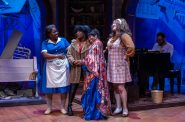The Florentine stages Elmer Gantry, an All-American opera
A composer and a librettist walk into a bar and order drinks to celebrate the premiere of their new opera.
Normally, in the opera world, that would be a punchline. First performances of new operas are hard to come by. Second runs are nearly impossible.
But the Florentine Opera’s William Florescu was serious when he approached Robert Aldridge and Herschel Garfein after their Elmer Gantry premiere at the Nashville Opera in 2007. (Here, by the way, is what they drank that night at the Hermitage Hotel bar in Nashville.) Gantry will open Friday night at Marcus Center Uihlein Hall.
Not only that; Florescu arranged for a professional recording of the opera, to be distributed world-wide on the Naxos label. He also had his company build a lavish but economical set that other companies can rent. A second performance, a recording and a one-truck, rentable set are the three key elements that give a new opera a chance at a long life.
Aldridge and Garfein worked on Elmer Gantry for 18 years. They suffered mightily when a planned premiere fell through way back in 1994. At an interview Monday, they were basking in the glow of Nashville success and the confidence of success in Milwaukee.
“We really thought it would be on the shelf forever,” Garfein said. “But every time we went to put it on the shelf, we thought we’d go at it one more time to get it right before we put it away.”
So they didn’t waste those long years of failed pitch meetings with opera companies, bare-bones workshops and hopes lifted and dashed. They polished and revised again and again.
“The long wait made it a much better piece,” Aldridge said. “I knew more about orchestration. If we had kept everything we cut out, we would have had five-hour opera. And the wait gave us the perfect director in John Hoomes.”
Hoomes, the Nashville Opera’s artistic director, gave Elmer Gantry a shot and directed it in Nashville. He is directing for the Florentine, too. (Florentine audiences will recall his extraordinary Salome, with Erica Sunnegård, in the 2007-’08 season.) Before turning to the stage, Hoomes studied for the music ministry at Samford University, in Birmingham, Alabama. Hoomes understands the story and what Aldridge and Garfein tried to do with it.
They based the opera on Sinclair Lewis’ 1927 novel about tent-show revival life. The title character is an unprincipled preacher/huckster who pitches in with Sharon Falconer, a charismatic revivalist Lewis based on real-life Aimee Semple McPherson. Gantry and Falconer build their revival business into a money-making machine and end up with an enormous temple in Los Angeles. (McPherson did this in real life; her Church of the Foursquare Gospel still exists.) Both the book and Robert Brooks’ excellent 1960 film, starring Burt Lancaster, take dim views of revival culture in particular and fundamentalism in general.
Garfein and Aldridge researched the opera by attending revivals all over the South and Midwest. They are more sympathetic than Lewis and Brooks, even though their personal practices of religion are miles away from fundamental Protestantism. They never failed to become emotionally involved with the revivals they originally intended to merely observe. As Aldridge put it, such religion is “alive from the neck down,” and there’s something to be said for that.
“The book and the movie present very clear points of view,” Garfein said. “The book reveals the untruths of religion. The movie is about its dangerous crowd mentality. We want everyone who sees the opera to have their own view of what’s going on.”
“We wanted to be in the middle,” Aldridge said. “We don’t spare the sarcasm, but some things about this sort of religion are powerful. That’s not so much in the book or the movie. The best art doesn’t necessarily take a view point. It just tells a story.”
“In [Mozart’s] Don Giovanni, everyone sings from their own point of view,” Garfein said. “That’s the way life is. Opera can be much more like life that people give it credit for.”
Both Aldridge, 55, and Garfein, 52, adore Mozart and took him for their model for Gantry, their first opera. They decided at the start that this would be a numbers opera, that is, an opera of arias connected by recitatives. That has long been out of style among the cognoscenti. Wagner started a trend toward through-composed opera, which has held sway ever since. Continuous arioso style, in which the singing never quite rises to full-blown melody, was the rule in the late 20th century. If people left your opera whistling its tunes, you weren’t intellectually respectable as a composer.
That doctrinaire attitude has shifted in the last 20 years, partly because of the influence of the Minimalists and partly because composers such as Aldridge have chosen to follow their instincts, however conventional and tuneful they might be. His music for Gantry draws without apology on Gospel and other vernacular American styles. Sharon Falconer’s entrance aria sounds like a folk song.
“Nothing reveals more about a character than a great aria,” Aldridge said.
“We’re interested in getting into the souls of these characters,” Garfein added.
“Every composer tries to find his musical language and then hopes it will grow emotionally,” Aldridge said. “When we started, I thought I would write the piece and then move on to another style. But as it evolved, I thought: Hey, I don’t have to move on. I’ve found my language.”
One of the biggest problems, as they workshopped the piece with various casts over the years, was getting singers to buy into to natural American diction and, to some extent, into a vernacular style of tone production.
“We were arrogant enough to intervene about the unnecessary stress on the important word and the turning of singing into a demonstration of singing rather than part of a theatrical experience,” Garfein said.
“We want it to sound like real Americans are singing this stuff,” Aldridge said.
The two said they made the big decisions — tonal idiom, numbers opera, vernacular styles, less venom toward religion — within two minutes of deciding to write the opera. The two had been friends on the new-music scene in Boston. After they both landed university jobs, they still lived fairly close together and kept in touch. Garfein, a composer as well as a writer, is on the music faculty at New York University. Aldridge is the chair of the music department at Montclair State University, in New Jersey. They hatched Gantry after Christmas dinner at the Aldridge’s in 1990. They watched the Lancaster movie and decided that night. Lorraine Hunt Lieberson, the late, great mezzo, was Garfein’s girlfriend at the time and was there. Which led to another big, first-two-minutes decision: Sharon Falconer would be a mezzo-soprano.
Hunt Lieberson did not live to sing the role, but thanks to Nashville Opera and the Florentine, Elmer Gantry has every chance to live a long life on opera stages all over America.
“For years, I walked around with this opera in my head,” Aldridge said. He blinked and shook his head slightly. “In 30 minutes, I’ll see 150 people rehearse it in Uihlein Hall. It’s a remarkable thing.”
“I saw it in Nashville, and it just bowled me over,” Florescu said. “I’ve never seen an audience react to a new opera the way that one did. I had to do it in Milwaukee. It was a gut instinct, but I’ve never been so sure of anything in my life.”
An opera producer walks into a bar…
The Florentine Opera Company will present Elmer Gantry at Marcus Center Uihlein Hall at 7:30 p.m. Friday and 2:30 p.m. Sunday, March 19 and 21. Tickets are $28-$140 at the Florentine’s website, phone order line (291-5700 ext. 224) and at the Marcus box office, 414-273-7206.
Cast, Credits
Elmer Gantry, Keith Phares; Sharon Falconer, Patricia Risley; Eddie Fislinger, Frank Kelley; Lulu Baines, Heather Buck; Frank Shallard, Vale Rideout; T.J. Rigg, Jamie Offenbach; Rev. Baines, Matthew Lau.Conductor, William Boggs; Director, John Hoomes; the Milwaukee Symphony Orchestra.
Theater
-
‘The Treasurer’ a Darkly Funny Family Play
 Apr 29th, 2024 by Dominique Paul Noth
Apr 29th, 2024 by Dominique Paul Noth
-
Rep’s Nina Simone Play a Puzzle
 Apr 23rd, 2024 by Dominique Paul Noth
Apr 23rd, 2024 by Dominique Paul Noth
-
Skylight’s ‘Eternity’ Is a Slam Bang Show
 Apr 15th, 2024 by Dominique Paul Noth
Apr 15th, 2024 by Dominique Paul Noth


























too bad there is not a sound bite of the music in the article. this is an unknown work and I need a tickle.
Hi Roy, lots of sound samples are at the Elmer Gantry site linked near the top of the story. — Tom